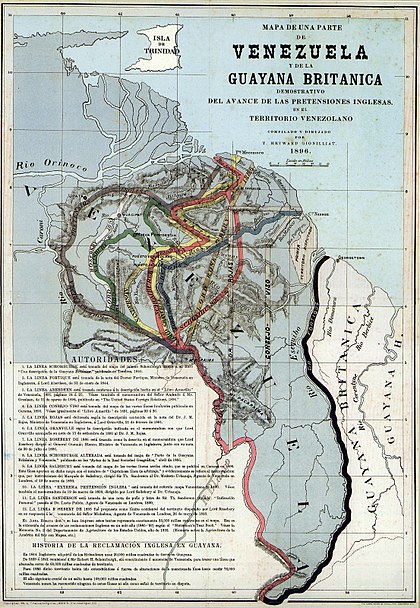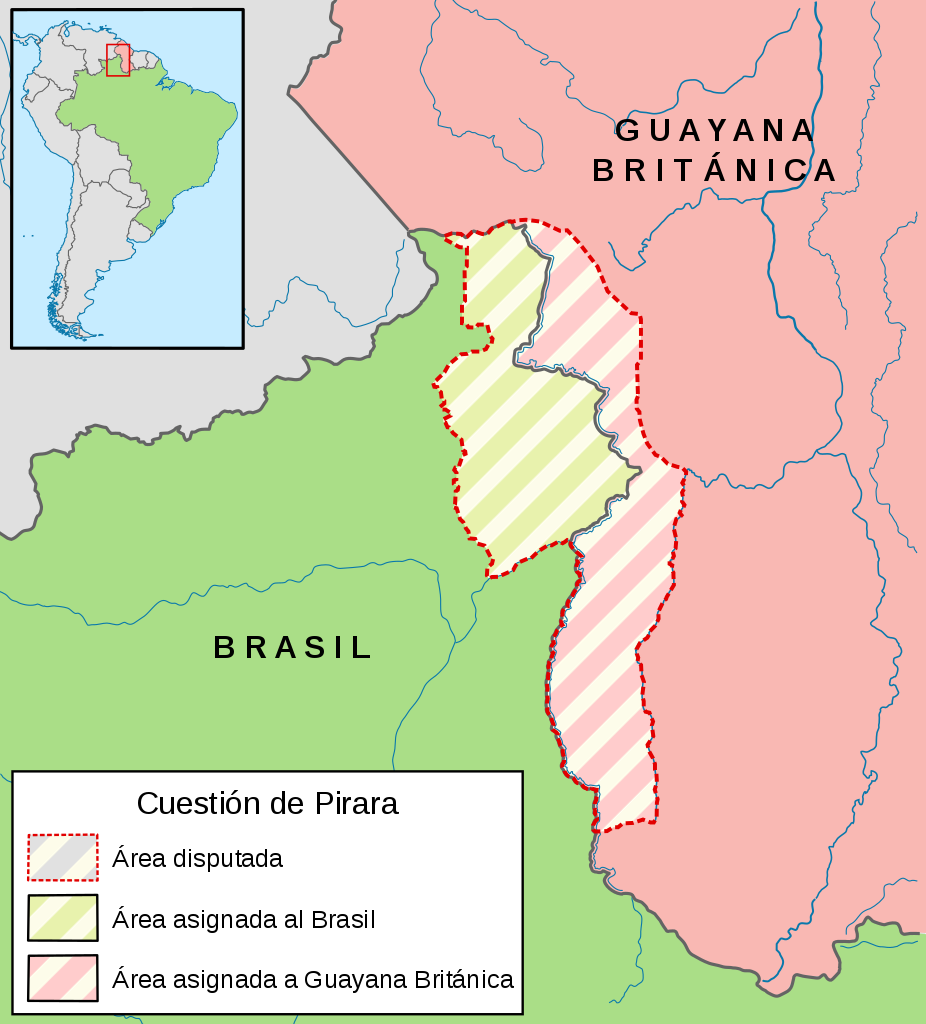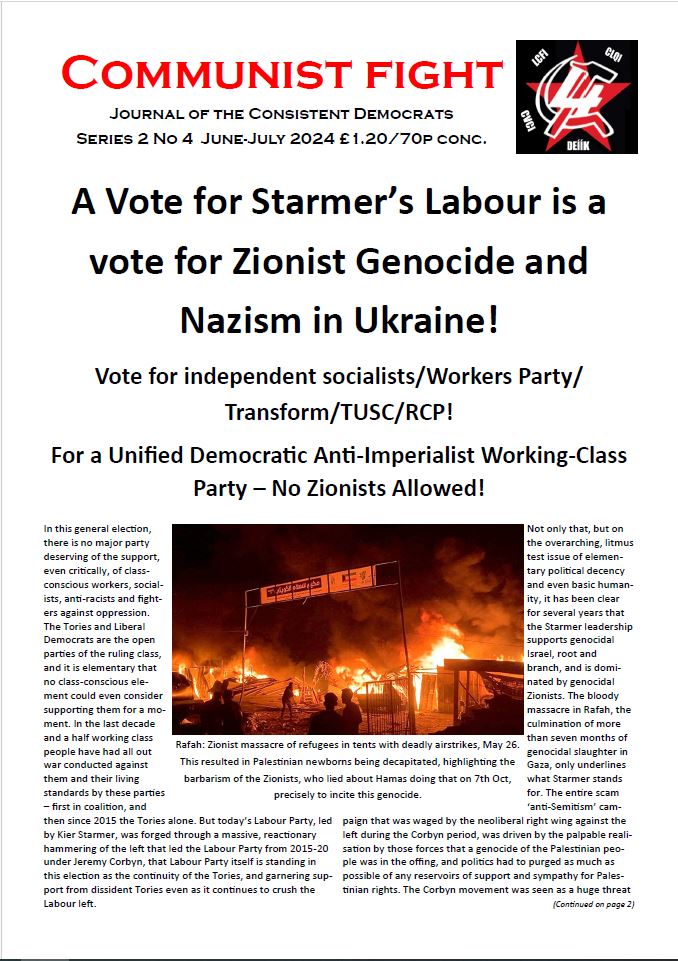In the camp of Venezuela, against Exxon Mobil and Anglo-Yankee imperialism!
Communist Party (Brazil)

Bolshevik Militant Tendency (Argentina)

Essequiba Guyana, also known as Essequibo territory, historically belongs to Venezuela. It has an area of 159,542 km² that the Cooperative Republic of Guyana administers as its own, but whose sovereignty is claimed by the Bolivarian Republic of Venezuela based on the Geneva Agreement of February 17, 1966.
Guyana Essequiba has been part of Venezuelan territory since the time of the Captaincy General of Venezuela. It was seized in 1899, through a fraudulent arbitration award established between the United States and Great Britain, which also took over a large part of the territory of Venezuela (it also took even a part of the territory of Brazil) which ceded the territory of Venezuela to Great Britain.
“The Venezuelan position was based on the fact that the border should be the midline of the Essequibo River, by virtue of the principle Uti possidetis iure (as you possessed, you will continue to possess) by which it corresponded to the territories of the former Captaincy General of Venezuela at the time of its independence in 1810, which, it is alleged, had the Essequibo River as its eastern boundary…” the United Kingdom’s position had “as its greatest aspiration to reach as far as the mouth of the Orinoco River and control its navigation”.
Wikipedia: Arbitration Report of Paris, report on the Guayana Esequiba in the XIX century


The territory of Guyana Essequiba was part of a territorial dispute that Venezuela historically had with the United Kingdom at the time when Guyana was formally part of the British colonial empire. Today, behind the siege on Guyana are American and British interests.
“Venezuela’s claim has intensified since the discovery of oil in the Essequibo by ExxonMobil in 2015. Guyana last month announced another major discovery that adds at least 10 billion barrels to the country’s reserves, making them larger than those of Kuwait or the United Arab Emirates. Guyana, therefore, has the largest per capita oil reserves in the world and Venezuela, the largest proven reserves on the planet.”
Latin American Center for Strategic Analysis, Esequibo: sovereignty, petroleum… and Exxon Mobil, 12/02/2023
In 2011, Guyana unilaterally decided to make modifications to its maritime continental shelf for oil exploration, affecting Venezuela’s territorial sea, without prior notice from Guyana to the Venezuelan Ministry of Foreign Affairs.
In March 2015, tension rose again between Guyana and Venezuela , following Guyana’s announcement that it would sanction oil exploration in the waters of the Stabroek Block by the North American company Exxon Mobil. This company is a corporation resulting from the process of maxi-concentration of imperialist capital, from the merger of the companies Exxon, Mobil and Esso, all from the USA. It is one of the “four sisters” global cartel of multinational oil companies, formerly known as the criminal “seven sisters” of the 1960s. The other three are Chevron-Texaco, Shell and BP. The concern arises because the Stabroek Block is located in disputed waters with Venezuela.
Therefore, we are more than anything else in a dispute between Venezuela and the imperialist oil corporations, in this case Exxon Mobil.
According to the Association of Petrobrás Engineers, AEPET,
“The small South American state, Guyana, has recently emerged as what is being described as the world’s hottest offshore oil frontier. A consortium led by ExxonMobil controls the prolific 6.6 million-acre Stabroek block offshore Guyana, where more than 30 world-class oil discoveries have been made and is at the centre of the former British colony’s burgeoning oil boom. Exxon, the operator of Stabroek, which holds a 45% stake, with 30% held by partner Hess and the remaining 25% by Beijing-based CNOOC, is ideally positioned to be the biggest beneficiary of Guyana’s oil boom. The consortium guaranteed especially favourable conditions for the Stabroek Block, making it an especially profitable venture, particularly for Exxon, becoming a key driver of production and profit growth.”
AEPET: Exxon is the biggest winner of the epic oil boom in Guyana, Success in Guyana shows the importance of researching the Brazilian Equatorial Margin, 09/19/2023
On December 1, the international court of justice, like all so-called multilateral organizations, dominated by imperialism, asked Venezuela not to take decisions that would alter control over the territory in dispute with Guyana, in clear reference to the referendum in Venezuela on the topic in question.
(See https://www.sandiegouniontribune.com/en-espanol/noticias/story/2023-12-01/cij-emitira-fallo-sobre-referendo-de-venezuela-respecto-a-disputa-con-guyana)
Maduro’s government won the non-binding referendum on the annexation of Essequibo, in dispute with Guyana, this Sunday, 3, with more than 90% of the votes and a participation of almost 50%, according to the National Electoral Center (CNE).
(See https://elpais.com/america/2023-12-04/el-chavismo-gana-el-referendum-para-la-anexion-del-esequibo-y-eleva-la-tension-con-guyana.html)
“The five questions that would be asked to the citizens, the people’s response being as follows:
1) Do you agree to reject, by all means, in accordance with the law, the line fraudulently imposed by the Paris arbitration award of 1899 which seeks to deprive us of our Essequiba Guyana? 97.83% of people answered “Yes” and 2.17% answered “No”.
2) Do you support the 1966 Geneva Agreement as the only valid legal instrument to reach a practical and satisfactory solution for Venezuela and Guyana with regard to the dispute over the territory of Guyana Essequiba? 98.11% responded “Yes” and 1.8% responded “No”.
3) Do you agree with Venezuela’s historical position of not recognizing the jurisdiction of the International Court of Justice to resolve the territorial dispute over Guiana Essequiba? 95.40% responded “Yes” and 4.10% responded “No”.
4) Do you agree to oppose, by all means, in accordance with the law, Guyana’s claim to unilaterally dispose of a pending sea to be delimited, illegally and in violation of international law? 95.94% responded “Yes” and 4.06% responded “No”.
5) You agree to the creation of the state of Guayana Esequiba and the development of an accelerated plan for the comprehensive care of the current and future population of that territory, which includes, among others, the granting of Venezuelan citizenship and identity cards, in accordance with the Geneva Agreement and International Law, consequently incorporating the State on the map of Venezuelan territory? 95.93% responded “Yes” and 4.07% responded “No”.
The Anglo-Saxon imperialist media, replicated by its parrot agencies in Latin America, tries to sell the version that Venezuela wants to invade poor Guyana to take its recently discovered oil, but the historical reality is the opposite.
The reconquest of this territory, or at least the demand for it, corresponds not only to a brake on the historically oppressed country, Venezuela, in the face of imperialism’s rapacious expansionist aspirations, but it is also another symptom of the decline of imperialism in its courtyard. back, which allows the oppressed Venezuelan nation to dispute what was stolen from it at the birth of the imperialist era of capitalism.
Who is interested in a conflict in this region?
This region, like all of Latin America, is of interest to imperialism. Therefore, it is not something as simple as “returning to Venezuela what rightfully belongs to it”. A conflict in the region could lead to yet another proxy war that will serve imperialist interests in the sale of weapons and ammunition and also a possible intervention by US imperialism in the region.
The threat of a war in Latin America is an integral part of the wars between Anglo-Saxon-EU imperialism and the oppressed peoples ongoing in Ukraine and Palestine. Also, in these other hot conflicts of the current cold war between NATO and the BRICS, there are disputes for control of the main energy matrix of the imperialist era, oil. In Ukraine, the war, intentionally provoked by the USA, was to abort the process of supplying Russian gas to Europe. In Palestine, the Zionist enclave of Israel seeks not only to evacuate Palestinians from their land but also to seize rich Palestinian gas and oil reserves. And, strategically, there is the geopolitics of an imperialism that has been trying to carry out a successful coup d’état in Venezuela for 20 years, losing space in global control.
For some time now, the presence of US troops carrying out training in the Amazon has been reported in the alternative media. This catches our attention even more. It may be that they are not just in training, but preparing for the moment of attack. “Troops with more than 60 United States military personnel arrived at Belém Air Base to participate, for the first time, in special training with the Brazilian Army in the Amazon.” (G1 – For the first time, US troops arrive in the Amazon for training with the Brazilian Army; VIDEO).
If they are preparing for an invasion, they are probably doing all the necessary research to organize it.
Venezuela’s mobilization, both political and military, is defensive and fair from a historical point of view and even more so from the point of view of Latin America’s sovereignty in relation to imperialism and its multinationals. Maduro is reacting, carrying out a counter-offensive, as Hamas and other Palestinian organizations have also done, as Russia did against NATO’s expansionism towards Eastern Europe. All these counter-offensives are symptoms of a historical moment of external and internal weakening of US imperialism and its system of global geopolitical domination. It is imperialism that is pursuing the war, because it wants both the natural and energy riches of the region as a reason to militarily attack Venezuela, and as a way to win the commercial-diplomatic dispute with China over Guyana.
Diálogo Chino: China extends its reach Guyana, 28/01/2019
The conflict, still political and diplomatic for now, is a time bomb. The following factors conspire for the explosion to occur: the recent discoveries of a lot of oil in an area historically in dispute, the concern of imperialism with the region where the Cuban workers’ state is located, the greatest enemy of the USA since 1961, aggravated by the rise of nationalism of the Chavista left in Venezuela in the 21st century, the internal ethno-political differences not resolved in Guyana itself, which in turn also did not complete its political independence in relation to imperialism, that is, the country cannot even be classified as a semi-colony. (International Context, CINT: Guyana: Oil, Internal Disputes, the USA and Venezuela, Jan/April 2023).
We defend the political, social and military mobilization of Venezuela. We fight for “Out with Exxon-Mobil!, Out with Anglo-Saxon imperialism!”, for the joint exploitation of the wealth of Essequiba for the benefit of the people of Venezuela and Guyana, like the Itaipu and Yacireta Hydroelectric Power Plants, binational plants. The first belongs to Brazil and Paraguay. The second, respectively, to Paraguay and Argentina. When it was completed, Itaipu was the largest dam in the world, a title it held for 21 years until the construction of the Three Gorges Hydroelectric Plant in China in 2003. The Itaipu Binacional plant continues to be the world leader in clean and renewable energy production. An anti-imperialist unity between Venezuela and Guyana against imperialism and its parasitic monopolies would benefit both nations and could result in a binational enterprise superior to that of Itaipu, based on more fraternal ties of wealth distribution.
This does not seem to be the interest of the government of Irfaan Ali, president of Guyana of the People’s Progressive Party/Civic (PPP/C), a party that was born in 1950 as a labour-type party but today is a vassal of the USA, an agent of Exxon-Mobil, against Venezuela, economically and militarily, and for the exploitation of energy resources in lands and waters stolen from Venezuela. “Exxon “captured” Guyana “without firing a shot”. It is increasingly difficult to determine where the company ends and the government of the South American country begins.” (Intercept, How Exxon Captured a Country Without Firing a Shot, 06/18/2023).
Intercept reporter Amy Westervelt draws attention to a decision by a Guyanese court against the country’s Environmental Protection Agency (EPA) and Exxon – strangely, co-defendants in the case:
“Two Guyanese citizens have accused the EPA of never demanding a guarantee from Exxon that the company would cover all costs related to a possible oil spill. The oil company’s assessments indicate that such a disaster could send oil to the beaches of 14 different islands in Guyana. Caribbean – and all could hold Guyana liable for damages. The costs would be astronomical, which is why licenses for offshore drilling require not only a liability insurance policy independent of Exxon, but also an unlimited financial guarantee to cover costs in excess of those covered for insurance. What the oil company didn’t do and continues to not do. Exxon executives join the president of Guyana in his suite at cricket matches, and the vice president regularly holds press conferences to defend the company. Vincent Adams , a petroleum engineer from Guyana and former head of the country’s EPA, said he planned to have monitors on board Exxon platforms. “All of that has been cancelled. Even Exxon’s files and authorizations, which used to be in the document center with everyone else, are under lock and key in the director’s office,” he said. “There is no oversight going on because Exxon doesn’t want oversight…”
idem
In addition to all this, controlling the country, its resources and its governments, Exxon-Mobil, which also controls an important fraction of imperialism, intends to drag Venezuela into a war and perhaps realize the dream that British imperialism had, to conquer all the Orinoco basin, today predominantly Venezuelan. If this requires using the Guyanese people as cannon fodder, imperialism and its multinational will not hesitate, after all:
“Guyana needs money to lift its people out of poverty, [but is now] going through another cycle of what development economists call ‘the resource curse’ – the phenomenon of countries with an abundance of natural resources ending up with less growth economy, democracy or development – go do it. ‘Where is the gold money? Where is the bauxite money? Where is the diamond money? Where is the sugar money? Where is the agriculture money? Where is the money of fishing, etc.? The list is almost endless because we are full of wealth,’ she said. ‘And yet the people in this country are poor.’
idem
During the Trump period, when new oil reserves were discovered in the region, the colonization of Guyana by the USA was accentuated. Using, once again, the lame justification of the “War on Drugs”, imperialism expanded the tentacles of its repressive apparatus on the continent and the siege on Venezuela and Cuba.
Irfaan Ali with US Secretary of State Mike Pompeo, September 2020:
“In September 2020, in a joint statement with US Secretary of State Mike Pompeo, President Irfaan Ali said the two countries would begin joint maritime patrols aimed at drug interdiction near Guyana’s disputed border with Venezuela, plagued by crisis. The deal came as US oil major Exxon Mobil Corp, as part of a consortium with Hess Corp, increased crude oil production from Guyana’s massive Stabroek offshore block , a large portion of which is in waters claimed by Venezuela. Pompeo and Ali added that ‘greater security, greater ability to understand its border space, what is happening within its Exclusive Economic Zone – these are all things that give Guyana sovereignty.’ “
Wikipedia: Guyana–United States relations
The Guyanese president who preceded Irfaan Ali, David A. Granger, advocated the establishment of organic US ties with Guyana, which should become a US territory or enter its Commonwealth similar to Puerto Rico. In other words, Guyana would go back from being an almost semi-colony to openly assuming the status of a US colony, like Puerto Rico. The unity of the Latin American peoples presupposes their independence from imperialism, in this case, from the government of Guyana, today, the new battering ram of imperialism against Caracas, after the failure of coups d’état, blockades, military invasions, Guidós, etc.
And the working class?
Workers are not interested in the conflict, much less the interference of US imperialism. Workers know that the existing wealth in the region, regardless of the state flag, must be used to provide better living conditions for everyone.
The unity of workers in Latin America and the Caribbean, including Venezuelans and Guyanese, is necessary against the offensive of imperialism, in this case by the Anglo-Saxon bloc, against the oppressed peoples of the region.
At this moment, we communists defend the unity of workers in the region, in defence of the great local wealth and that the interests of the respective states are never above the interests of the workers.
We must take advantage of the moment to debate the real way out for the working class in Latin America, that is, to create new, larger Cubas, without imperialist blockades, from the perspective of creating the Federation of Socialist States of Latin America.

